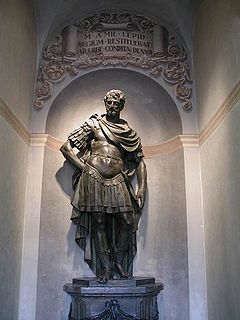Gnaeus Manlius Vulso is the name of:
| This disambiguation page lists articles about people with the same name. If an internal link led you here, you may wish to change the link to point directly to the intended article. |
Gnaeus Manlius Vulso is the name of:
| This disambiguation page lists articles about people with the same name. If an internal link led you here, you may wish to change the link to point directly to the intended article. |
Year 189 BC was a year of the pre-Julian Roman calendar. At the time it was known as the Year of the Consulship of Nobilior and Vulso. The denomination 189 BC for this year has been used since the early medieval period, when the Anno Domini calendar era became the prevalent method in Europe for naming years.

The gens Manlia was one of the oldest and noblest patrician houses at Rome, from the earliest days of the Republic until imperial times. The first of the gens to obtain the consulship was Gnaeus Manlius Cincinnatus, consul in 480 BC, and for nearly five centuries its members frequently held the most important magistracies. Many of them were distinguished statesmen and generals, and a number of prominent individuals under the Empire claimed the illustrious Manlii among their ancestors.
Lucius Manlius Vulso Longus was a Roman patrician, who became consul in 256 and 250 BC. He has been remembered as another militarily successful Roman consul; his military achievements significantly contributed to the victory of the Romans in the First Punic War.

Marcus Aemilius Lepidus was a twice Roman consul, Pontifex Maximus, Censor and Princeps Senatus. A scion of the ancient Patrician gens Aemilia, he was most likely the son of Marcus Aemilius Lepidus, with his brothers being Lucius and Quintus.
Gnaeus, also spelled Cnaeus, was a Roman praenomen derived from the Latin naevus, a birthmark. It was a common name borne by many individuals throughout Roman history, including:

Attalus II Philadelphus was a King of Pergamon and the founder of modern-day Turkish city Antalya.
Gnaeus Manlius Vulso was a Roman consul for the year 189 BC, together with Marcus Fulvius Nobilior. He led a victorious campaign against the Galatian Gauls of Asia Minor in 189 BC during the Galatian War. He was awarded a triumph in 187 BC.
Titus Manlius T.f. Torquatus was a patrician Roman Republican consul for 299 BC, elected along with a plebeian co-consul Marcus Fulvius Cn.f. Paetinus.

The Galatian War was a war between the Galatian Gauls and the Roman Republic supported by their allies Pergamum in 189 BC. The war was fought in Galatia in central Asia Minor, in present-day Turkey.

The Battle of Mount Olympus was fought in 189 BC between the Galatian Gauls of Asia Minor and an alliance consisting of the Roman Republic and Pergamum. The battle ended in a crushing allied victory. Livy is the main source for this battle, and his description can be found in book 38, chapters 17-23.
The Trocmii or Trocmi were one of the three ancient tribes of Galatia in central Asia Minor, together with the Tolistobogii and Tectosages, part of the possible Gallic group who moved from Macedonia into Asia Minor in the early third century BCE. All three tribes were beaten in 189 BCE by the Roman consul Gnaeus Manlius Vulso at the battles of Mt. Olympus and Mt. Magaba.
Gaius Atilius Regulus Serranus was a Roman Republican consul who twice held the consulship in the middle of the 3rd century BC. His elder brother, father, and grandfather were all consuls.
Tabae or Tabai was a city in ancient Caria, although, according to Strabo it was located in a plain in Phrygia on the boundaries of Caria. The place is now Tavas, near Kale, Denizli in Turkey; some inscriptions and numerous ancient remains have been found.
Musaeus was an officer of Antiochus III the Great, the ruler of the Seleucid Empire. Following his defeat in the Battle of Magnesia Antiochus III sent Musaeus to the triumphant Roman consuls, then stationed at Sardis to request their permission to start negotiating a peace treaty. According to Polybius Scipio Nasica received him courteously and granted him a safe passage back, with his consent to start negotiating a truce.
Gnaeus Manlius Vulso was Roman consul in 474 BC with Lucius Furius Medullinus Fusus.

The lex Publilia, also known as the Publilian Rogation, was a law traditionally passed in 471 BC, transferring the election of the tribunes of the plebs to the comitia tributa, thereby freeing their election from the direct influence of the Senate and patrician magistrates.
Aulus Manlius Vulso was a Roman politician in the 5th century BC, and was a member of the first college of the decemviri in 451 BC. In 474 BC, he may have been elected consul with Lucius Furius Medullinus. Whether or not the decemvir is the same man as the consul of 474 BC remains unknown.
Lucius Furius Medullinus Fusus was a Roman politician in the 5th century BC, and consul in 474 BC.